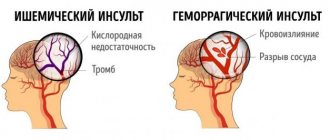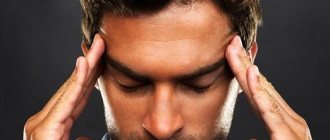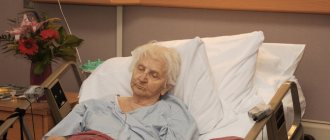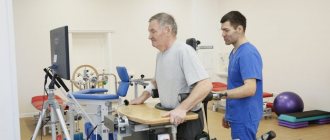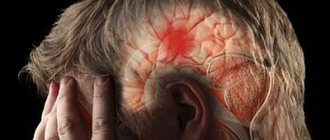Human long-term and short-term memory can be compared to a modern information repository, in which it is easy to find the necessary data.
- Why do memory impairments occur after a stroke?
- What are the manifestations of memory impairment?
- What is the danger of memory loss after a stroke?
- Is memory restored after a stroke?
- How long does it take to recover memory after a stroke?
- Care and recovery after a stroke at the Olympia House nursing home
Relatively speaking, all actions are reproduced by the brain on the basis of collected, processed and applied information, which must be ensured for safety in any situation.
Thanks to active thought processes, a person identifies himself, remembers how to walk and talk, eat and chew. Unfortunately, a disease such as stroke in older people can lead to the loss of certain areas of memory, which leaves a negative imprint on every moment of life after a stroke.
Why do memory impairments occur after a stroke?
The consequence of a blockage or rupture of a vessel is a stroke, and a person can suffer such a condition on his feet without noticing any changes. In some cases, the circulatory system suffers, which cannot deliver oxygen-enriched blood to a certain area of the brain and the cells of the cortex gradually die.
Cellular necrosis and lack of proper medical care remain the main causes of deterioration in health after a stroke. Against the background of such complications, partial or complete paralysis, immobilization of facial muscles and drooping of the corner of the mouth or eye, speech dysfunction and memory loss develop.
If the problem is noticed in a timely manner and qualified recovery after a stroke , it is possible to avoid the consequences. This situation is due to the fact that when a certain part of the brain is inactive, living cells can perform additional functions after a rehabilitation program.
It is impossible to predict the consequences of a stroke, but immediately after diagnosing such a condition, doctors can provide the necessary assistance. And by organizing proper care at home or placing an elderly person in a special rehabilitation boarding house, you can restore all lost body functions.
Memory problems
Nowadays, the problem of memory impairment is one of the most important problems. It can appear regardless of age.
Unhealthy diet, bad habits, lack of oxygen, a large flow of information, stress, high psycho-physical stress and insufficient ability to manage your memory, all this affects the functioning of memory.
It is possible to eliminate and prevent memory problems only if you find out the causes of its occurrence and eliminate them in a timely manner.
Factors influencing memory impairment
Probably one of the most important factors affecting memory is the use of psychoactive substances, and this is drug use, excessive consumption of alcoholic beverages, tobacco smoking, hookah smoking, spice, etc., which greatly stimulates not only the development of memory impairment, but also significantly reduces concentration. If you care about your health and you care about your memory, protect yourself from these bad habits, which are often no longer habits, but alcohol addiction, drug addiction, tobacco addiction or another psychoactive substance.
Everyone has probably noticed that sometimes he himself, and many people around him, manage to receive information from several sources at once, for example, reading a newspaper and watching TV. Due to such an excess of information, a person is not always able to concentrate on the subject whose information needs to be remembered. Thus, a large flow of information can cause thoughtless perception of all this information. All this leads to a lack of desire to concentrate one’s attention on one source of information.
One of the reasons that influence memory problems is poor nutrition.
Stressful situations, depression and troubles at work, all this does not have a positive effect on our memory, which deteriorates due to a person’s constant experiences. Thus, showing concern, even about your forgetfulness, will only increase your memory problems.
Factors influencing memory improvement
Scientists have proven that a healthy and balanced diet not only preserves, but also improves our memory. In order to stimulate metabolism in brain cells, our body needs vitamins and microelements that contribute to this. Walking in the fresh air and playing sports have a positive effect on our memory. A lack of oxygen in the body impairs the functioning of the brain and negatively affects a person’s memory.
Healthy sleep is the basis of a healthy body, and therefore good memory. Especially sleep in the dark, because that’s when brain cells are restored. Thus, subject to a healthy sleep regime, memory will work in full force at the neuronal level. Any sleep disturbance will almost instantly affect the quality of memory.
Alzheimer's disease and Parkinson's disease are serious diseases of the brain, which are also certainly associated with memory impairment.
Therefore, if you have problems with memory and some other problems with the functioning of the brain, you should consult a doctor. But memory problems are not always associated with physical and biological problems. You've probably noticed more than once that you remember some information better than others. For example, some cannot remember even a few dozen product names, but they remember hundreds of numbers in an area that interests them, without spending much time on memorizing them. Such situations should not be perceived as memory problems; rather, what you are trying unsuccessfully to remember does not interest you, and it takes a sufficient amount of time to remember such information.
Memory impairment associated with overlapping information
There are theories in psychology that explain the nature of the existence of forgetting. For example, the result of extinction of a memory trace is described in the theory of attenuation. But current interference theory states that recall of an earlier memory trace becomes less likely due to the superposition of older information on later information. This theory can be explained as follows: what can happen if a person first remembers one piece of information, and then studies similar information, but different in some respects from the previous one.
Then two outcomes are possible: either the first stream of information prevents the new one from being remembered, or the second stream of information replaces the first, thereby erasing the old information from memory. There are cases that reflect this theory. For example, you have computer keyboards at work and at home, the settings of which are different from each other. And when you work, at home, you begin to get confused and press keys that correspond to the layout at work, and if you work on a work computer, the same situation can happen, since you alternately get used to each keyboard.
Memory loss associated with information loss
There is a theory according to which information that has not been used for a long time gradually disappears from a person’s memory. This may also be due to the years lived and the age of the person. But I can't agree with this theory, at least not completely. The fact is that science and history know of cases when at an early age some people were able to speak some non-native language, but after many years this language was forgotten, which in principle would confirm this theory. But as they grew older, some of them began to remember this language and even speak it calmly, to the surprise of everyone around them. This can be explained by the fact that information is stored in our memory in different “storages”, and if this information is not used for a long time, the address and code to this storage are lost. And for those people who, in their old age, suddenly remembered that lost information, this address was inexplicably located.
What are the manifestations of memory impairment?
Modern medicine proposes to consider human memory on the basis of two components that play an important role in its formation. These are short-term and long-term memory, responsible for the safety of ever-memorized information used in mental processes.
After a stroke, memory loss of various types can be diagnosed, and after such a diagnosis, the recovery process can begin with an individual selection of techniques:
- verbal memory impairment;
- visual memory disorders;
- loss of motor skills;
- disturbances of emotional-figurative memory.
The most complex and difficult to recover cases include vascular dementia, which cannot be cured. Such a diagnosis cannot be considered as a death sentence, although elderly people with dementia after a stroke completely lose adequate perception of the surrounding reality. With a properly selected course of rehabilitation and well-carried out recovery, it is possible to slow down the process of deterioration of a person’s condition and adapt it to reality.
Why does memory disappear?
The human brain is a complex and multifunctional organ. Impairment of memory functions, reduction up to complete loss is possible due to:
- brain injury;
- oncological diseases when the tumor is localized in one of the brain structures;
- diseases due to the development of infection (meningitis, encephalitis)
- stroke with damage to the lining of the brain;
- failure of the cardiovascular system;
- metabolic disorders
- stress , lack of sleep;
- eating junk food, including endogenous food;
- age , memory loss most often affects older people;
- lack of vitamins in the body, due to the lack of supply to the brain in sufficient quantities;
- smoking , alcohol, taking drugs, heavy metals (detrimental to brain structures);
- poor ecology, which inevitably leads to memory deterioration with age.
What is the danger of memory loss after a stroke?
The extent of the destructive impact of a stroke on the memory of an elderly person is difficult to assess without an accurate diagnosis. It depends on the intensity and area of hemorrhage or the number of dead cells in a certain hemisphere of the brain, so rehabilitation procedures should be started immediately.
The problem of memory loss manifests itself in the difficulties faced by older people who cannot identify themselves. They do not remember their childhood and adolescence, they lose their walking skills and coordination of movements, they do not understand how to eat or carry out basic hygiene.
Another dangerous point is psychological discomfort, depression and anxiety in older people. After memory loss, an elderly person sees unknown people and unfamiliar objects around him; everything seems alien and frightening to him, which can cause psycho-emotional breakdowns.
How to restore memory in adults and elderly people?
There are many different exercises, medications and folk remedies known to restore memory. A diet also helps improve memory; when chosen correctly, it has a beneficial effect on all cells and structures of the brain.
Medicines
For memory and thinking disorders, in order to increase brain performance, improve blood circulation and normalize sleep, experts advise taking:
- Glycine , place 1 tablet under the tongue up to 3 times a day;
- Noopept for oral administration to improve memory and increase brain stability;
- Piracetam to normalize concentration, activate memory with frequent dizziness, mood swings;
- Phenotropil for diseases of the central nervous system, decreased concentration and memory;
- Nootropil is indicated for use by older people to restore memory in case of excessive forgetfulness. Old people sometimes cannot even remember their first name, last name, residential address, and are unable to explain their place of stay;
- Vitrum Memory to stimulate brain activity. Indicated for use by older people who experience problems not only with memory, but also with hearing and vision;
- Piracetam , a psychotropic drug, is prescribed to patients on an individual basis. Contraindicated for pregnant women or those with kidney problems;
- Encephabazole , prescribed to children for pathological processes in the brain that began development from birth
- Aminalon , an amino acid drug to enhance metabolism, normalize the brain's absorption of glucose, improve and restore memory after a stroke. Helps with alcohol intoxication and patients with diabetes;
- Intellan for stress, depression, memory loss.
In the fight against memory loss, homeopathic remedies have proven themselves well for stimulating, activating brain activity, and providing a beneficial effect on the mental and endocrine system, these are:
- Cerebrum compositum to increase brain activity and immune system activity;
- golden iodine to normalize blood circulation in the brain, also for older people with weakened memory, lack of sleep, frequent headaches and dizziness;
- memoria to strengthen brain vessels, normalize metabolic processes of brain activity;
- polymnesin to improve the functioning of thought processes.
Plant-based preparations that are completely harmless for people of any age should be given preference:
- periwinkle;
- Dietary supplements , the composition of which helps maintain memory in the elderly;
- ginger to increase blood circulation and improve concentration;
- black pepper to activate, revitalize the mind, increase the absorption of substances;
- Moss to improve memory, supply the brain with oxygen, glucose and antioxidants.
The body (in particular, the brain) is unable to fully function if there is a lack of vitamins.
Adults and elderly people are recommended to take:
- Intellan to increase intellectual capabilities, eliminate stress, depression, improve memory;
- Tsikovit is indicated for use by schoolchildren and elderly people to enhance mental capabilities (especially during the off-season);
- Vitrum Memory , memory forte to enhance the assimilation of information entering the brain.
You can also learn more about drugs for restoring memory and improving cerebral circulation from another article from our website.
Diets
Diets (low-calorie ones in particular) are indicated for older people with memory problems. The right ones can increase brain function by up to 30%.
To retain information and improve brain performance, one cannot do without including glucose and sugar in the diet to rejuvenate memory, as well as spices to normalize brain function:
- anise;
- turmeric;
- ginger;
- caraway;
- dill;
- cardamom;
- basilica
You can combine different types of spices.
The main thing is to achieve, by applying a diet developed by a doctor or nutritionist, equipping the supply of oxygen to the brain, normalizing your metabolic processes, and improving blood circulation.
Folk remedies
There are several good recipes you can prepare at home to improve your memory:
- clover tincture . Dry the flowers and chop them. To 2 tbsp. l. add boiling water (0.5 l), let it brew for up to 2 days. Take 0.5 cups 3 times a day before meals. The course of treatment is 2 months;
- rowan bark . Prepare a decoction of dry bark. 1-2 tbsp. pour boiling water (1 glass), leave for 2-3 hours, then drink 1-2 tbsp. l. up to 3 times a day;
- pine buds. It is better to collect in the spring. You need to chew raw up to 4 pieces per day for 1 month.
Is memory restored after a stroke?
Destroyed neural connections can be restored and this will provide the opportunity to partially or completely restore a person’s memory.
But for this it is necessary to create optimal conditions and develop a set of techniques, regularly conduct classes and monitor the current state of health of an elderly person:
- systematic memory training and activation of thought processes;
- drug therapy using memory improving drugs;
- using intellectual games and exercises to strengthen memory.
Classes and exercises should not overload the brain; in a person’s life it is important to find time for rest and entertainment. A specialized private boarding house for the elderly in the Moscow region offers unique and individually adaptable rehabilitation program complexes for people who have suffered a stroke.
What helps restore memory?
Unfortunately, memory does not last long. Head injuries, age, taking harmful drugs, bad habits, overwork, stress, nervous shock, poor diet, and lack of physical activity worsen its functions.
When the problem becomes noticeable and anxiety arises, you should not run to the pharmacy. All medications should be purchased only with a doctor’s prescription after a thorough examination.
Instead of taking pills, it is better to focus on your diet; it should be balanced and regular. In addition, there are foods that are very good for memory:
- chocolate;
- dried fruits;
- sour cream;
- fresh fruits and vegetables (especially carrots, apples and bananas);
- cottage cheese;
- seaweed;
- seeds;
- buckwheat;
- rice;
- nuts.
These products should be included in your daily diet in reasonable quantities.
Physical exercise is also necessary for any healthy body. Massages with essential oils will be useful.
You can train your memory in different ways. The most popular and easily accessible exercises are those aimed at developing logic and attention. You can find them on websites or programs (Vikium, Bitreinika, Fobrain), and you can also find similar applications on your smartphone. This method of training is the most convenient, varied, and easy to use.
How long does it take to recover memory after a stroke?
Rehabilitation procedures after a stroke carried out by specialists at our private boarding houses include an integrated approach. This means that in addition to memory restoration, psychologists work with patients to help stabilize their psycho-emotional state and return to normal life.
The process of memory restoration and its duration depend solely on the diagnosis and the degree of destruction of the neural network. It is very important that the patient immediately after a stroke begins to undergo a rehabilitation course and follows all the doctor’s instructions so that the changes become reversible.
Having lost memory and part of cognitive abilities, a person feels disoriented and often becomes depressed. For older people, it is important to organize optimal conditions for therapy and create comfortable psychological conditions under which rehabilitation will be as effective as possible.
Care and recovery after a stroke at the Olympia House nursing home
The rehabilitation programs used by our specialists include all the necessary measures to restore memory and cognitive processes.
Olympia House, a network of private boarding houses for the elderly, specializes in providing quality medical services for residents:
- compliance with the conditions of therapy and rehabilitation;
- psychological comfort and calm environment;
- constant supervision by experienced caregivers;
- assistance in hygiene procedures, feeding;
- Qualified doctors work with patients.
During rehabilitation and socialization, qualified psychologists actively work with elderly people living in boarding houses. We maintain a friendly and relaxed environment, provide leisure activities and experienced staff to provide assistance to people in dire need.
A stroke in old age can be suffered on the legs, but lack of treatment and rehabilitation can lead to the development of various consequences. Our network of boarding houses provides high-quality and targeted care for the elderly in Moscow and provides individual rehabilitation services for residents.
